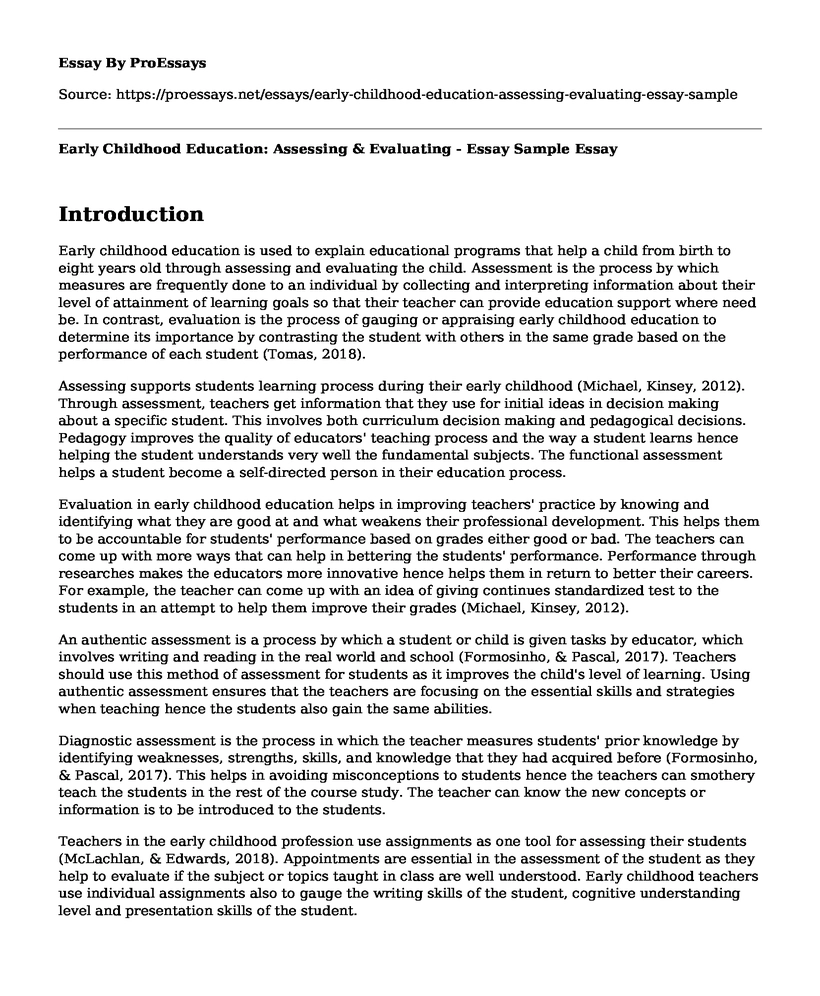Introduction
Early childhood education is used to explain educational programs that help a child from birth to eight years old through assessing and evaluating the child. Assessment is the process by which measures are frequently done to an individual by collecting and interpreting information about their level of attainment of learning goals so that their teacher can provide education support where need be. In contrast, evaluation is the process of gauging or appraising early childhood education to determine its importance by contrasting the student with others in the same grade based on the performance of each student (Tomas, 2018).
Assessing supports students learning process during their early childhood (Michael, Kinsey, 2012). Through assessment, teachers get information that they use for initial ideas in decision making about a specific student. This involves both curriculum decision making and pedagogical decisions. Pedagogy improves the quality of educators' teaching process and the way a student learns hence helping the student understands very well the fundamental subjects. The functional assessment helps a student become a self-directed person in their education process.
Evaluation in early childhood education helps in improving teachers' practice by knowing and identifying what they are good at and what weakens their professional development. This helps them to be accountable for students' performance based on grades either good or bad. The teachers can come up with more ways that can help in bettering the students' performance. Performance through researches makes the educators more innovative hence helps them in return to better their careers. For example, the teacher can come up with an idea of giving continues standardized test to the students in an attempt to help them improve their grades (Michael, Kinsey, 2012).
An authentic assessment is a process by which a student or child is given tasks by educator, which involves writing and reading in the real world and school (Formosinho, & Pascal, 2017). Teachers should use this method of assessment for students as it improves the child's level of learning. Using authentic assessment ensures that the teachers are focusing on the essential skills and strategies when teaching hence the students also gain the same abilities.
Diagnostic assessment is the process in which the teacher measures students' prior knowledge by identifying weaknesses, strengths, skills, and knowledge that they had acquired before (Formosinho, & Pascal, 2017). This helps in avoiding misconceptions to students hence the teachers can smothery teach the students in the rest of the course study. The teacher can know the new concepts or information is to be introduced to the students.
Teachers in the early childhood profession use assignments as one tool for assessing their students (McLachlan, & Edwards, 2018). Appointments are essential in the assessment of the student as they help to evaluate if the subject or topics taught in class are well understood. Early childhood teachers use individual assignments also to gauge the writing skills of the student, cognitive understanding level and presentation skills of the student.
Early childhood teachers also use observation as a tool to assess students. In consideration, teachers are required to take note of each student's actions, behaviors, reactions, and communication continuously. The teachers can take note of the level of participation of each student by the way the students are asking questions during a class lesson or discussion (McLachlan, & Edwards, 2018).
In the United States, early childhood education includes a wide range of periods (Stipek, 2018). It involves a part-day education, full-school-day, and full-day programs. They use programs like school programs, childcare centers, and family childcare homes to help in the growth process of their children since birth.
School-based program for United States children involves kindergartens, pre-kindergartens, compensatory education programs, and nursery schools. Most of the children under these programs attend them for either half the day, which is the most common or full- day. Teachers ensure that the children are involved practically in tasks like playing toys together. This is a curriculum activity that helps in the child's brain development (Stipek, 2018).
Center-based children care the full-day program in five days of a week for a full year (Stipek, 2018). Most of the centers in the United States provide care to children aged between 3-5 years while others provide care for infants and toddlers. The caretakers maintain children's health, safety, staff-child ratios, maximum number of children per group, and nutrition. They are licensed by the state, which ensures childhood rights are maintained.
Family care in the United States is the process by which many children are cared for by caregivers (Stipek, 2018). The number of children who uses this program is about 11% and under the age of 5 years. Caregivers are well trained and are required to observe children's activities like eating habits, interaction with other children, and the behaviors of the children.
References
Formosinho, J., & Pascal, C. (Eds.). (2017). Assessment and evaluation for transformation in early childhood. Routledge.
McLachlan, C., Fleer, M., & Edwards, S. (2018). Early childhood curriculum: Planning, assessment, and implementation. Cambridge University Press.
Michael, F., Kinsey, K. (2012). The Importance of Early Childhood Education. Nova. https://www.researchgate.net/publication/233763048_The_Importance_of_Early_Childhood_Education
Stipek, D. (2018). Early childhood education in California. Getting Down to Facts II.
Tomas, Y. (2018). Assessment and evaluation in Education. Amazon, Wiley publishers. https://www.academia.edu/35685843/ASSESSMENT_AND_EVALUATION_IN_EDUCATION
Cite this page
Early Childhood Education: Assessing & Evaluating - Essay Sample. (2023, Mar 11). Retrieved from https://proessays.net/essays/early-childhood-education-assessing-evaluating-essay-sample
If you are the original author of this essay and no longer wish to have it published on the ProEssays website, please click below to request its removal:
- Case Study Example: Diabetic Type 1 in a Student
- Same-Sex Schools Essay Example
- Term Paper on Teaching Reading: Cognitive Development & Comprehension
- Essay Sample on Play: A Tool for Development and Expression
- American Student Education: Solving Conflict and Illiteracy - Essay Sample
- Essay Sample on 8 Questions to Sharpen Thinking and Improve Critical Thinking
- Free Essay on Navigating Societal Norms: An Exploration of Social Interaction through Eye Contact







